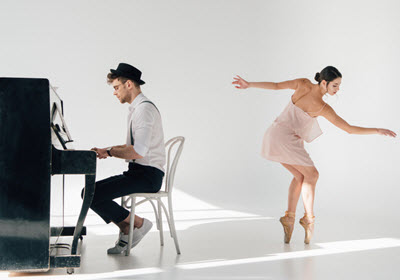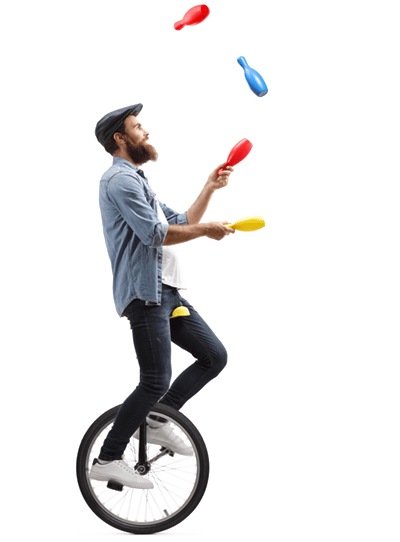Performance and skill development for music, dance, acting, acrobatics…
 How do we get better?
How do we get better?
We practice. And practice. And practice. But sometimes the number of hours doesn’t lead to as much progress as we think it should.
We play the piece of music faster… not noticing that we are tightening our hands.
We put more emphasis on the funniest line in the play… but end up sounding desperate.
We try to dance with our full range of motion, extending our legs into an arabesque… but don’t see how much we have pulled our pelvis backwards and tightened our lower back in the process.
 To get better, we have to practice SMARTER.
To get better, we have to practice SMARTER.
When we focus on achieving a goal, we don’t put enough attention on the PROCESSS necessary to achieving it.
When we focus on some end goal – hitting that high note with perfect intonation or jumping as high as we can – we don’t always realize what we are sacrificing to achieve that goal. So, our voice sounds strained, and we stiffen our body to get the jump so high. We don’t do as well as we want, so we try harder… and harder still.
What we don’t realize is that trying harder without attention to HOW we are trying is the wrong approach.
 In fact, the best approach is to stop trying to achieve the goal.
In fact, the best approach is to stop trying to achieve the goal.
To stop fixating. To stop trying. This first step – what we call inhibition in Alexander lessons – takes practice. But when we truly allow ourselves to stop being so narrowly focused on what we want to achieve, we give ourselves the opportunity to do something different. When we give ourselves permission for things to be different, we can allow for greater choice.
As an improvisational performer, that might mean we actually don’t do anything – we put space into the otherwise busy string of notes or words. Or we might give ourselves permission to do something different – to play a harmony note or syncopate the rhythm, to move up when you’re expected to move down or fast when expected to move slowly.
And when our performance has to be planned and technically perfect, the permission to do otherwise means that we achieve what we intend to, but without tension and strain or conveying rigidness in what we have practiced.
The goals we thought we had to put effort into achieving are right in front of us – available to us – as long as we STOP trying so hard to get them.
 Here’s how we’ll get you focused on the process…
Here’s how we’ll get you focused on the process…
In addition to leaving space for choice and freshness in our performance, we can clarify how we can be more physically and mentally present in ourselves.
The Alexander technique can clarify how to think about yourself-in-activity in a way that gives you a different kind of control – you can stop micro-managing the details and, instead, prioritize what will allow you to move with freedom and ease, to stand with dynamic poise, and draw on movement that is naturally coordinated.
As a musician, you can learn to use your head and back with length and an easy uprightness that will offer support for your arms so they can move freely and without tension.
As a singer or actor, you can learn to release tension in your head and neck that strains your voice and have a torso that is free and expansive so that your breathing is full and supportive of your voice.
As a dancer or acrobat, you can develop a more integrated use of your head, torso, and limbs that allows you to move your body as a whole, instead of controlling individual parts as if they work separately from each other. You can also develop the use of your head and torso that leads to a lengthened spine and good postural support, so your limbs can move freely.
The Alexander Technique can help you develop a conscious approach to practicing and performing. It helps you clarify exactly what deserves your attention… so you can use yourself with ease and freedom. As a performer of any sort, you can be more in charge of yourself, your decisions, and your reactions to what happens on stage.
When we practice with ease and clarity, we develop the ability to bring those same qualities into our performances.
 Bringing a conscious approach to your performance…
Bringing a conscious approach to your performance…
The process of paying attention to ourselves while we are practicing makes us more present while we are performing.
You can find a greater sense of control over what you have practiced… but without stiffness.
You can improvise more spontaneously and creatively.
You can respond effortlessly, in the moment, so the audience has no idea your partner missed their cue or that you played a wrong note.
You can develop an integrated use of your mind and body, so you don’t have to sacrifice yourself in order to make progress.
Take your performance to a higher level!
Schedule a free consultation to find out how you can achieve more than you imagined – as you stop focusing on what you want to achieve and, instead, bring your attention to yourself in a whole new way.

